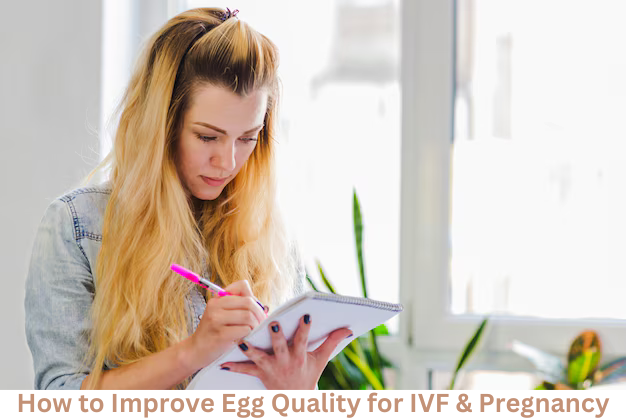How to Improve Egg Quality for IVF & Pregnancy
Egg quality plays a crucial role in IVF success. While many factors contribute to egg health, lifestyle changes can significantly enhance your chances of achieving a successful pregnancy. Here are some practical tips to improve egg quality and optimize your IVF journey:
Nutrition for Healthy Eggs
Nutrient-Dense Diet: Prioritize whole, unprocessed foods rich in vitamins, minerals, and antioxidants. Focus on fruits, vegetables, lean proteins, whole grains, and healthy fats.
Essential Nutrients: Incorporate foods high in folate, iron, vitamin D, and omega-3 fatty acids. Consider consulting with a registered dietitian for personalized nutritional guidance.
Antioxidant-Rich Foods: Protect your eggs from oxidative damage by consuming foods rich in antioxidants, such as berries, dark chocolate, and leafy greens.
Maintain a Healthy Weight
Balanced Weight: Being overweight or underweight can affect hormone levels and egg quality. Aim for a healthy BMI through a balanced diet and regular exercise.
Consult a Healthcare Professional: If you're struggling with weight management, seek guidance from a healthcare provider or registered dietitian.
Exercise Regularly
Moderate-Intensity Exercise: Engage in activities like walking, swimming, or yoga for at least 30 minutes most days of the week.
Improved Blood Flow: Regular exercise helps improve blood flow to the ovaries, promoting healthy egg development.
Manage Stress
Stress Reduction Techniques: Practice relaxation techniques like meditation, deep breathing, or yoga to reduce stress levels.
Prioritize Self-Care: Make time for activities you enjoy to promote overall well-being.
Limit Harmful Substances
Avoid Smoking: Smoking can significantly damage egg quality and reduce fertility.
Reduce Alcohol Consumption: Excessive alcohol intake can negatively impact hormonal balance and egg health.
Limit Caffeine: While moderate caffeine consumption is generally safe, excessive intake may affect fertility.
Adequate Sleep
Quality Sleep: Aim for 7-8 hours of uninterrupted sleep each night to support hormonal balance and overall health.
Create a Sleep-Conducive Environment: Ensure your bedroom is dark, quiet, and cool.
Environmental Factors
Minimize Exposure to Toxins: Reduce exposure to environmental pollutants, pesticides, and heavy metals.
Consider Water Quality: If you have concerns about your local water quality, consider using a water filter.
Consult with a Fertility Specialist
Personalized Guidance: A fertility specialist can provide tailored advice based on your individual circumstances.
Address Underlying Issues: They can help identify and address any underlying health conditions that may be affecting egg quality.
Remember, while these lifestyle changes can significantly improve egg quality, it's important to consult with a healthcare professional for personalized guidance.
New World Fertility Centre is committed to supporting you on your journey to parenthood. Our experienced team can provide comprehensive care, including fertility assessments, treatment options, and personalized guidance to help you achieve your family goals.
Frequently Asked Questions
1. Can I improve my egg quality if I'm already in my 30s or 40s?
While egg quality naturally declines with age, making lifestyle changes and consulting with a fertility specialist can still be beneficial. Even women in their 30s and 40s can improve their chances of successful IVF by adopting healthier habits.
2. How long does it take to see improvements in egg quality after making lifestyle changes?
The timeline for noticeable improvements in egg quality can vary. It may take several months of consistent lifestyle changes to see positive results.
3. Can supplements help improve egg quality?
Some supplements, such as folic acid, omega-3 fatty acids, and antioxidants, may support egg health. However, it's essential to consult with a healthcare professional before starting any new supplements.
4. Is there a specific diet that can improve egg quality?
A balanced diet rich in fruits, vegetables, whole grains, lean proteins, and healthy fats is recommended. Focus on incorporating foods high in antioxidants, vitamins, and minerals.
5. Can stress negatively impact egg quality?
Yes, chronic stress can negatively affect hormone levels and egg quality. Managing stress through relaxation techniques and self-care is important.

 Aug-23-2025
Aug-23-2025